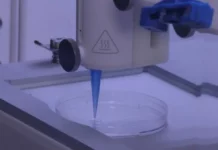Logically, if blood supply is restored to previously ischemic tissues, function in those tissues should return to normal. After all, oxygen is returning so stunned cells can start metabolizing again. Unfortunately, this is not the case. Reintroduction of blood to ischemic tissues has the potential to cause damage – a paradoxical phenomenon known as ischemia-reperfusion injury (IRI) which involves the release of highly destructive free radicals that cause cell death and subsequent inflammation.
While comparatively less known, IRI’s is the cause of many medical predicaments. They happen after myocardial infarctions, strokes, and are one of the reasons organ transplantations fail.
Mitochondria based treatment
Mitochondria-based treatments are a relatively new concept in medicine. At the forefront of this revolution is a company called cellvie. Their mission is to use mitochondrial transplants to reduce IRI damage.
According to cellvie’s CEO, Alexander Shueller:
“The objective of cellvie’s approach is to rescue mitochondria function by the augmentation and replacement of mitochondria, which are damaged during ischemia…Akin to jump-starting a car, the exogenous mitochondria re-invigorate the stunned cells’ energy metabolism, re-enabling them to turn oxygen into energy.”
To achieve this, the company is working on creating a delivery vehicle that can transport the exogenous mitochondria to cells. The cells can then take up these organelles via endocytosis and use them to return to their normal metabolic state. The delivery system itself is also quite simple: a systematic injection or a direct one into the affected organ.
While new, this treatment could potentially be a useful asset while treating ischemic diseases. It also has applications in organ transplantation surgeries and the company does plan on targeting kidney transplants. As Schueller explains, kidney transplants are subject to graft function. A time delay between harvesting the kidney are implanting it may cause its tissues to become ischemic, which may mean that the kidney is no longer useful and must be discarded. With so many people on the transplant waitlist, options like this mitochondrial transplant are highly coveted, and as Schueller says, “would go a long way in improving and saving patients’ lives, while reducing the burden to the health care system.”
While the company is still planning its human trials, they say they have learnt a lot from their animal studies. They are also the winners of the MedTech Innovator Value Award.
Source: Medgadget
https://www.medgadget.com/2020/12/mitochondrial-transplantation-to-treat-ischemia-reperfusion-injury-interview-with-dr-alexander-schueller-ceo-of-cellvie.html




